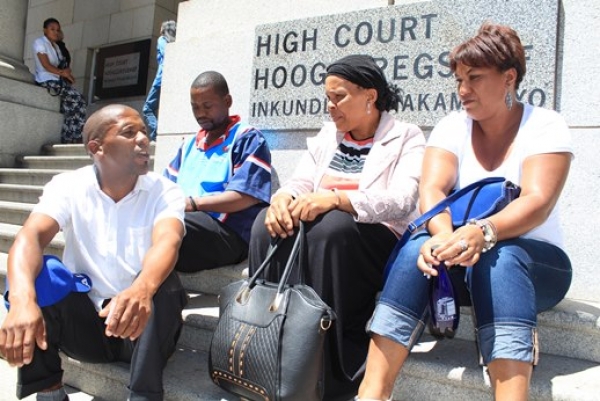
Jeffrey Haarhoff, Bulelani Mehlomakhulu, Angeline Arrison, Lisinda Bailey discuss the case
The dictatorship of debt takes many shapes, and Greece is not the only one to say NO! to predators this week. In a landmark case in South Africa, decided in the Western Cape High Court today, 15 low wage workers – cleaners, security guards, farm workers – took on the “micro loan” system of fast money, slow torture and death in life … and won!
Late last year, fifteen people in and around Stellenbosch, in the wine country of the Western Cape, approached the University of Stellenbosch’s Legal Aid Clinic, LAC, and asked for help. They explained that each had taken out a so-called micro loan, and found that at some point [a] the interest soared and [b] their salaries were “attached” by means of emolument attachment orders also known as EAOs or garnishee orders. While the fifteen basically wanted to get out of an impossible and unjust situation, the lawyers at LAC saw that the whole system was in violation of South Africa’s Constitution, and so, in November, they went to court.
As Lisinda Bailey, one of the applicants, explained, “I had to make monthly payments of R2,600 which was more than I can afford. As the only person working in my house, I struggled every month.” Angeline Arrison told a similar tale. Two years ago, she took out a loan of 2000 rand. Now half of her 4200 rand salary is seized every month, and she still owes and she still owes over 3000 rand. Others tell the same stories … and worse: already over indebted, trying to figure out how to organize and lighten the load, while retaining some semblance of dignity.
The fifteen also had the backing of Wendy Appelbaum, one of the wealthiest women on the African continent, a leading philanthropist and the owner of DeMorgenzon, a wine estate in Stellenbosch: “I became aware of the plight of one of my workers, from whom we were legally obliged to deduct most of his salary on behalf of loan sharks. I immediately addressed his circumstances, but discovered how widespread the abuse of garnishee orders had become. I was outraged and decided to intervene on behalf of the helpless and voiceless victims, and have played a convening and facilitating role.” Appelbaum took the fifteen to the Legal Aid Clinic.
The South African Human Rights Commission joined as a friend of the court, and has also taken up the public policy issue of garnishee orders. As SAHRC Commissioner Mohamed Shafie Ameermia explained, “We must knock on Parliament’s doors very seriously to say the house is on fire out there. We need to advocate and champion proper legislation, close the loopholes and gaps in the existing legislation so that at least poor people have the right to live decent lives.”
The fifteen – cleaners, security guards, farm and seasonal workers, evenly divided among women and men, uniformly vulnerable – and their lawyers argued that the credit providers and their lawyers obtained the orders illegally, often by going to distant courts, and that, further, the process was improper because the orders were issued by court clerks and not by magistrates or judges. For those who owed, there was no day in court in this process, only fog and mirrors.
Today, Western Cape High Court Judge Siraj Desai agreed: “The right of access to courts is fundamental to the rule of law in a constitutional state. The … respondents are obtaining judgments and EAOs against the applicants in courts far removed from their homes and places of work and in places which they could not hope to reach, the right to approach the courts was seriously jeopardised, if not effectively denied. This violation of the rights of debtors to access courts and enjoy the protection of the law was the product of the … respondents’ forum shopping for courts which would entertain their applications for judgments and the issuing of EAOs … This is the most disturbing feature of the debt collecting processes employed by the micro-lenders … The absence of judicial supervision and the consequences of the execution process infringes several of the debtors’ constitutional rights … The attachment of an excessive portion of a debtor’s earnings infringes on the right of the debtor and her family to dignity, as well as their rights to access to healthcare, food, education and housing.”
As Wendy Applebaum put it, “It’s a David and Goliath scenario here where their human rights and dignity have been taken away.” And David and Davida said NO! to predatory debt, to debt that consumes body and soul, to debt structures that crush human dignity, and today they won. From Syntagma Square to Stellenbosch, thus far it’s been a good week for the Great Refusal.
(Photo Credit: Masixole Feni / GroundUp.org.za)